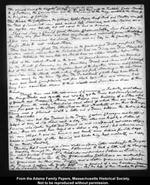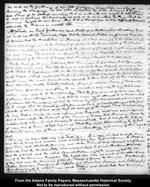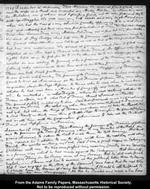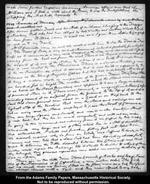The ancient Laws of the Visigoths are still in Use, and these, with the Institutes, Codes, Novelles &c. of Justinian, the Cannon Law and the Ordinances of the King, constitute the Laws of the Kingdom of Gallicia.
The Bread, the Colliflowers, the Cabbages, Apples, Pears, Beef, Pork and Poultry were good. The Fish of several Sorts were good, excellent Eels, Sardines, and other Species, and the Oysters were tolerable, but not equal to ours in America.
I had not seen a Chariot, Coach, Phaeton, Chaise or Sulky, since I had been in the Place, very few Horses and those very small and miserably poor; Mules and Asses were numerous but small. There was no Hay in the Country: The Horses, Mules &c. eat Wheat Straw.
There had been no frost. The Verdure in the Gardens and Fields was fresh. The Weather was so warm that the Inhabitants had no Fires, nor Fire Places, but in their Kitchens. We were told We should have no colder Weather before May which is the coldest Month in the Year. We found however, when We travelled in the Month of January in the Mountains, Frost and Snow and Ice enough. But at this time and in this Neighbourhood of the Sea, Men, Women and Children were seen in the Streets, with naked Legs and feet, standing on the cold Stones in the mud, by the hour together. The Inhabitants of both Sexes have black hair and dark Complexions, with fine black Eyes. Men and Women had long hair ramilied down to their Waists and sometimes down to their Knees.
Though there was little Appearance of Commerce or Industry, except about the Kings Docks and Yards and Works, yet the Town had some Symptoms of Growth and Prosperity. Many new Houses were building of a Stone which comes from the rocky Mountains round about, of which there are many. There were few goods in the Shops, little Show in their Marketts, or on their Exchange. There was a pleasant Walk a little out of Town, between the Exchange and the Barracks.
There were but two Taverns in the Town. Captain Chavagne and his Officers lodged at one, at six Livres each a day. The other was kept by a Native of America, who spoke English and French as well as Spanish, and was an obliging Man. Here We could have lodged at a dollar a day each: but where We were We were obliged to give an hundred and twenty nine dollars for six days besides a multitude of other Expences, and besides being kept constantly unhappy by an uneasy Landlady.
Finding that I must reside some Weeks in Spain, either waiting for the Frigate or travelling through the Kingdom, I determined to look a little into the Language. For which purpose I went to a Bookseller and purchased Sobrino's Dictionary in three Volumes in Quarto, The Grammatica Castillana an excellent Spanish Grammar in their own Tongue, and a Lattin Grammar in Spanish. My Friend Captain De Grasse gave made me a present of a very handsome Grammar of the Spanish Tongue by Sobrino. . . . By the help of these Books, the Children
as well as the Gentlemen of our little Company were soon employed in learning the Language. To one who understood the Latin it seemed to be easy and some of Us flatter'd ourselves, that in a Month We might be able to read it, and understand the Spaniards as well as be understood by them. But experience taught Us our Error and that a Language is very difficult to acquire especially by Persons in middle Life.
as well as the Gentlemen of our little Company were soon employed in learning the Language. To one who understood the Latin it seemed to be easy and some of Us flatter'd ourselves, that in a Month We might be able to read it, and understand the Spaniards as well as be understood by them. But experience taught Us our Error and that a Language is very difficult to acquire especially by Persons in middle Life.
Mr. Linde an Irish Gentleman, and Master of a Mathematical Accademy here, as well as Mr. De Tournelle, says, that the Spanish Nation in general have been of Opinion that the Revolution in America is a bad example to the Spanish Colonies, and dangerous to the Interests of Spain, as the United States if they should become ambitious and be seized with the Spirit of Conquest, might aim at Mexico and Peru. The Consul mentioned the Opinion of Raynalle, that it was not for the Interest of the Powers of Europe, that America should be independent.
To the Irish Gentleman I observed, that Americans hated War: that Agriculture and Commerce were their Objects, and it would be their Interest, as much as that of the Dutch to keep peace with all the World, untill their Country should be filled with People, which could not be for Centuries. That War and the Spirit of Conquest were the most diametrically opposite to their Interests, as they would divert their Attention, Wealth, Industry, Activity, from a certain Source of Prosperity and even Grandeur and Glory, to an uncertain one; nay to one, that it was certain never could be to their Advantage. That the Government of Spain over her Colonies had always been such, that she never could attempt to introduce such fundamental Innovations, as those by which England had provoked and compelled Us to revolt. And the Spanish Constitution was such, as could extinguish the first Sparks of discontent, and quell the first risings of the People. That it was amazing to me, that a Writer so well informed as R aynalle, could ever give an Opinion that it was not for the Interest of the Powers of Europe, that America should be independent, when it was so easy to demonstrate, that it was for the Interest of every one of them except England. That they could loose nothing by it, but certainly every one of them would gain something, and many of them a great deal.
Wee can see but a little Way into Futurity. . . . If, in 1807, We look back for seven and twenty Years, and consider what would have been the Consequence to Mexico and Peru and all South America, and all the French and Spanish West India Islands, had the United States remained subject to Great Britain, Mr. Linde and the Consul and the whole Spanish Nation might be convinced, that they owe much to the American Revolution. The English love War as much as We abhor it, and if they had now the American Cities for Places of Arms, the American Harbours for Shelter, American Provisions for Supplies and American Seamen and Soldiers for Reinforcements, by what tenure would France and Spain hold their American Dominions?




